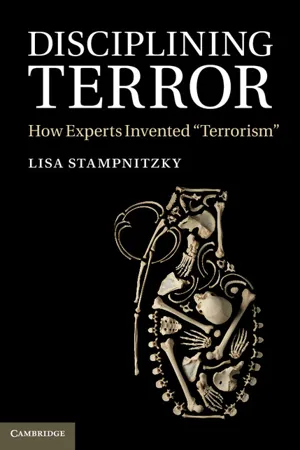
- English
- PDF
- Available on iOS & Android
About this book
Since 9/11 we have been told that terrorists are pathological evildoers, beyond our comprehension. Before the 1970s, however, hijackings, assassinations, and other acts we now call 'terrorism' were considered the work of rational strategic actors. Disciplining Terror examines how political violence became 'terrorism', and how this transformation ultimately led to the current 'war on terror'. Drawing upon archival research and interviews with terrorism experts, Lisa Stampnitzky traces the political and academic struggles through which experts made terrorism, and terrorism made experts. She argues that the expert discourse on terrorism operates at the boundary - itself increasingly contested - between science and politics, and between academic expertise and the state. Despite terrorism now being central to contemporary political discourse, there have been few empirical studies of terrorism experts. This book investigates how the concept of terrorism has been developed and used over recent decades.
Frequently asked questions
- Essential is ideal for learners and professionals who enjoy exploring a wide range of subjects. Access the Essential Library with 800,000+ trusted titles and best-sellers across business, personal growth, and the humanities. Includes unlimited reading time and Standard Read Aloud voice.
- Complete: Perfect for advanced learners and researchers needing full, unrestricted access. Unlock 1.4M+ books across hundreds of subjects, including academic and specialized titles. The Complete Plan also includes advanced features like Premium Read Aloud and Research Assistant.
Please note we cannot support devices running on iOS 13 and Android 7 or earlier. Learn more about using the app.
Information
Table of contents
- Contents
- Figures
- Tables
- Acknowledgments
- 1 Introduction
- 2 The invention of terrorism and the rise of the terrorism expert
- 3 From insurgents to terrorists: experts, rational knowledge, and irrational subjects
- 4 Disasters, diplomats, and databases: rationalization and its discontents
- 5 "Terrorism fever": the first war on terror and the politicization of expertise
- 6 Loose can(n)ons: from "small wars" to the "new terrorism"
- 7 The road to pre-emption
- 8 The politics of (anti-)knowledge: disciplining terrorism after 9/11
- 9 Conclusion: the trouble with experts
- References
- Index